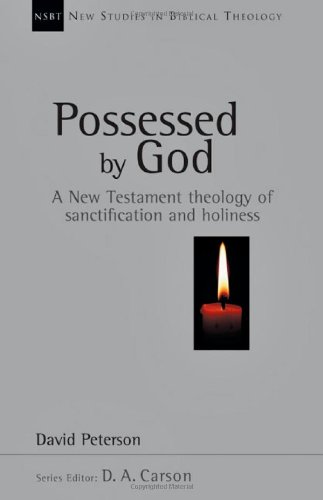Editor’s Note: We have mentioned previously our appreciation for David Peterson’s excellent work, Possessed By God and the important corrective it provides. We asked if he could provide us with a brief summary-explanation of his argument regarding sanctification particularly as it relates to regeneration – an issue often confused. Today he writes in response to our inquiry. Enjoy! And be sure to see the special offer at the bottom of this blog post!
Guest Blog by David Peterson
Although sanctification has traditionally been understood as the continuation and development of the new life given to us in regeneration, this confusion of biblical terms obscures important theological themes and the way they are related in Scripture.
In Possessed by God, I make the point that holiness is first and foremost a consecrated status that is given to Israel by calling and redemption (Exod. 19:4-6; Deut 14:2). Various rituals were prescribed to enable Israel to express that status and remain in a dedicated and exclusive relationship with the Lord God. Holiness was to be displayed in every sphere of life, but there is no theology of progressive sanctification in the OT. After the judgement of exile, God promised to show the holiness of his great name by bringing Israel back to himself, cleansing them from all their impurities, giving them a new heart, and putting his Spirit in them (Ezek. 36:22-32). This renewal of the covenant relationship would involve a reconsecration of Israel to serve God’s holy purpose in the world (Ezek. 37:24-28). These promises are fulfilled through Israel’s Messiah.
Sanctification in the NT is an integral part of the redemptive work of Jesus Christ (e.g., John 17:19; 1 Cor. 1:30; 6:11; Heb. 10:10). We experience the benefits through faith in the gospel, and this faith is made possible by the regenerative work of the Holy Spirit (e.g., Acts 26:18; 1 Cor. 1:2; 6:11; 2 Thess. 2:13-14). We become ‘saints’ (e.g., Rom. 1:7), and inherit Israel’s calling to pursue a holy lifestyle and manifest his holy character before an unbelieving world (e.g., 1 Thess. 4:3-8; 1 Pet. 2:9-12). Christians are sustained in holiness by the ongoing presence of the Holy Spirit, who causes us to remember who we are in the light of Christ’s saving work, and motivates us to live for him (e.g., 1 Cor. 6:19-20).
Definitive or positional sanctification is the gift of God to those who put their trust in Christ. The NT does not speak about becoming more and more holy, though the apostle Paul prays for the love of the Thessalonians to ‘increase and overflow,’ and asks God to strengthen their hearts, so that they will be ‘blameless and holy in the presence of our God and Father when our Lord Jesus comes with all his holy ones’ (1 Thess. 3:12-13; cf. 5:23-24). Change is described in terms of maturation (Eph. 4:13, 15-16), transformation (2 Cor. 3:18; cf. Rom. 8:29), and renewal (Rom. 12:2; 2 Cor. 4:16; Col. 3:10).
In Titus 3:3-8, regeneration and renewal are brought together and identified as the work of the Holy Spirit, whom God ‘poured out on us generously through Jesus Christ our Savior.’ The Spirit who enables us to believe that we are washed, sanctified, and justified ‘in the name of the Lord Jesus Christ’ (1 Cor 6:11), continues to renew our thinking about life and relationships, bringing about new attitudes and behaviour. Regeneration finds its continuation in renewal, and sanctification finds its continuation in Spirit-empowered enablement for holy living. These are different ways of describing the same work of God in us, though the terminology has different biblical roots and is used for different purposes.
The language of sanctification is used to describe the work of Christ in cleansing us from sin and consecrating us to himself as a people devoted to his service. Like justification, this assures us of our standing with God in Christ. The moral challenge is to live out the implications of this standing in practical holiness (cf. Rom. 6:11-23). The language of regeneration and renewal is used to explain how God makes faith in Christ possible and continues to change us through the work of his Spirit. This encourages us to respond to God’s imperatives and to look for the fruit in our lives (cf. Rom. 12:1-2).
Do you have any questions?
Editor’s Note: Dr. Peterson has graciously offered to entertain your questions! If you have questions for him on the doctrine of sanctification, please just contact us, and we will forward your question to him.
We look forward to hearing from you!
Buy the books

Possessed by God